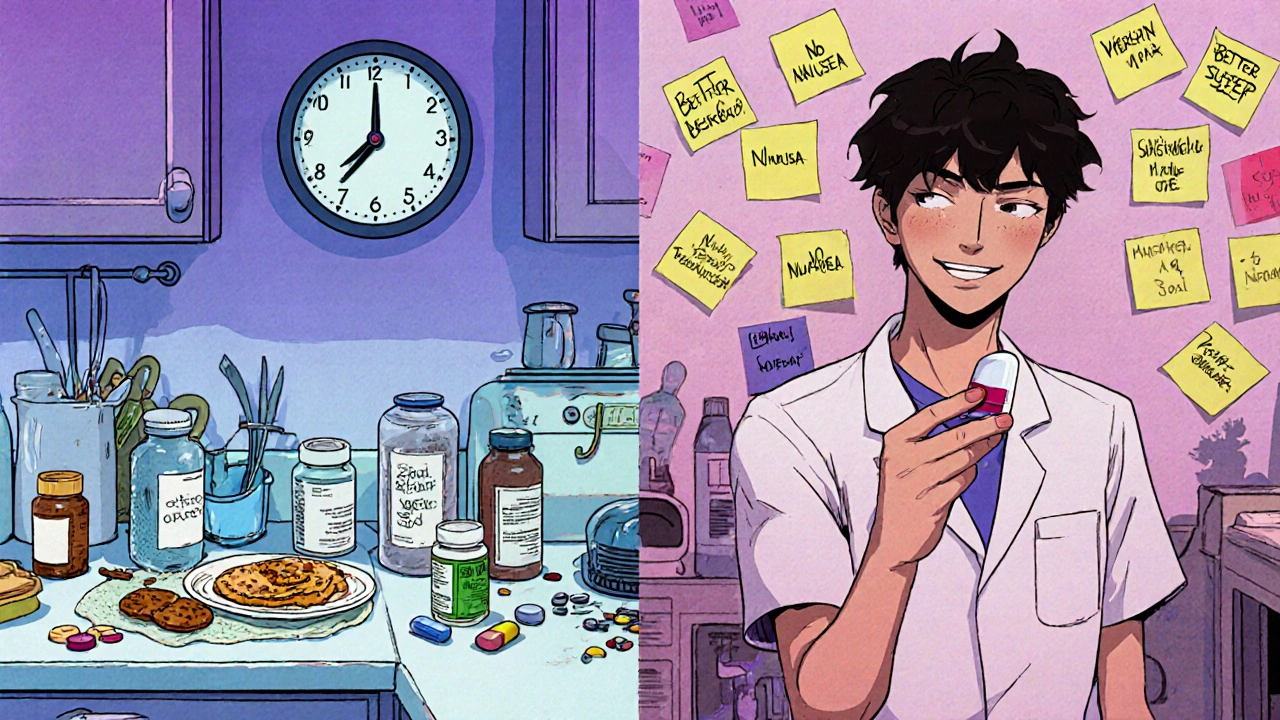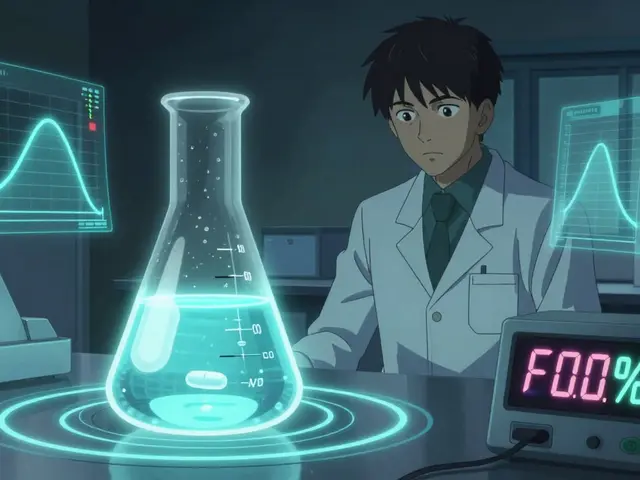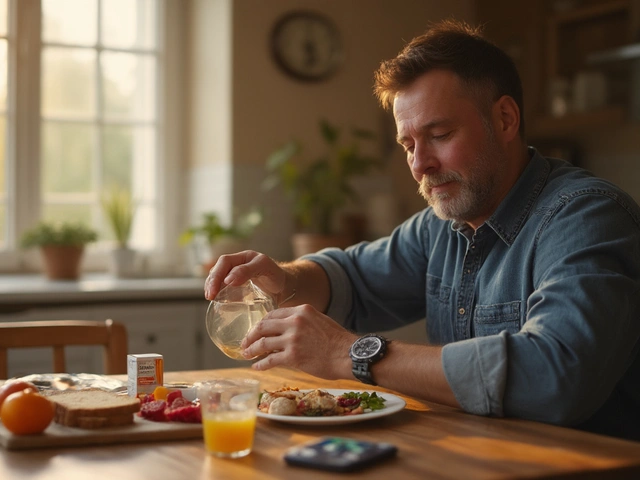It’s not about forgetting your pills. It’s about medication adherence-and how side effects quietly sabotage it.
Why You Stop Taking Your Medicine (Even When You Know You Shouldn’t)
You fill the prescription. You take it for a few days. Then the nausea hits. Or the dizziness. Or the fatigue that makes you cancel plans you’ve been looking forward to. Suddenly, skipping a dose feels like a small act of self-preservation. You tell yourself you’ll try again tomorrow. Tomorrow becomes next week. Then it becomes months.
This isn’t laziness. It’s not rebellion. It’s human.
According to the World Health Organization and U.S. Pharmacist (2025), roughly half of all people taking long-term medications don’t take them as prescribed. That’s not because they don’t care-it’s because the medicine itself makes them feel worse. Side effects are the silent killer of adherence. And they’re not always listed clearly on the label. Some show up slowly. Others hit hard after the first refill. A study in Frontiers in Pharmacology (2025) found that up to 80% of patients stop their meds over time-not because the treatment isn’t working, but because the side effects became unbearable.
And it’s worse for mental health meds. Patients with depression are twice as likely to skip their prescriptions, and when they do, it often leads to skipping other meds too. The cycle feeds itself: feeling worse → skipping pills → feeling even worse.
The Real Cost of Skipping Pills
Skipping doses isn’t just a personal choice-it’s a public health crisis.
In the U.S. alone, nonadherence causes about 125,000 preventable deaths every year. It’s responsible for up to 69% of medication-related hospitalizations. For chronic conditions like high blood pressure, diabetes, or cholesterol, missing doses isn’t a minor slip-it’s a direct path to heart attack, stroke, or kidney failure.
And the money? It’s staggering. Each patient who doesn’t take their meds as directed costs the system between $950 and $44,000 a year. That’s not just insurance bills-it’s lost workdays, emergency room visits, and long-term disability. Pharmacist-led programs have shown they can save $1,200 per patient annually just by helping people stick to their regimens.
But here’s the kicker: most doctors don’t know you’ve stopped taking your pills. A study in the British Journal of Clinical Pharmacology (2025) found that pharmacists documented nonadherence in only 52% of cases. Nurses did better-85%. Doctors? 70%. That means if you’re not telling them, they’re not seeing it. And if they don’t see it, they don’t adjust your treatment.
Side Effects Aren’t Just Inconvenient-They’re Misunderstood
Not all side effects are created equal. Some are mild and fade after a week. Others are severe and never go away. But here’s what most people don’t realize: many side effects can be managed-without quitting the medicine.
Take statins, for example. Muscle pain is a common complaint. But that pain isn’t always from the drug. Sometimes it’s from low vitamin D, dehydration, or even overexertion. A pharmacist can help you figure out if it’s the statin or something else-and if it is the statin, there are other options. Maybe a lower dose. Maybe a different statin. Maybe adding coenzyme Q10, which some studies suggest helps reduce muscle discomfort.
Antidepressants? Nausea and drowsiness in the first two weeks are normal. But if it lasts longer, it’s not “just part of the process.” It’s a signal. Your body might need a different medication, or a different time of day to take it. Taking it with food. Switching from morning to night. These small tweaks can make all the difference.
And let’s talk about the fear factor. Many people worry about drug interactions or long-term damage. They’ve heard stories. They’ve seen memes online. But without clear, personalized advice, fear becomes a reason to stop. That’s where pharmacists step in-not to sell you more pills, but to explain what’s real and what’s noise.

What Actually Works to Keep You on Track
There’s no magic app, no fancy alarm, no sticker chart that fixes this alone. Real adherence comes from support that’s tailored, timely, and human.
Here’s what the data says works best:
- Face-to-face pharmacist consultations: These have an 83% success rate in improving adherence. Why? Because you can ask questions, show your symptoms, and get immediate feedback.
- Medication reviews every 90 days: A simple 20-minute chat with a pharmacist can cut nonadherence by 35% in just three months.
- Combining meds into one pill: If you’re taking five pills a day, that’s five chances to forget. Combination pills (like those for high blood pressure and cholesterol) reduce the burden and increase success.
- Cost transparency: If you’re skipping doses because you can’t afford the refill, you’re not being irresponsible-you’re being realistic. Pharmacists can help you find patient assistance programs, generic alternatives, or mail-order options that cut costs by up to 70%.
- AI-driven alerts: New tools now predict who’s at risk of dropping off based on refill patterns, side effect reports, and even pharmacy visit history. When you’re flagged, a pharmacist reaches out before you fall off track.
One study showed that when pharmacists worked directly with patients to manage side effects, adherence jumped from 73.9% to 89.3%. That’s not a small win-it’s life-changing.
What to Do If You’re Struggling
You don’t have to suffer in silence. Here’s what to do right now:
- Write down every side effect. Not just the big ones. The dry mouth. The weird taste. The trouble sleeping. Even if it seems minor, write it down. This isn’t for you-it’s for your pharmacist.
- Don’t wait for your next doctor’s appointment. Go see your pharmacist. They’re trained to handle this. They can adjust timing, suggest alternatives, or call your doctor for a change.
- Ask about combination pills. Can your blood pressure, cholesterol, and diabetes meds be combined? If so, it cuts your daily routine in half.
- Check your refill schedule. Are you running out because you’re waiting for a refill? Set up auto-refill. Many pharmacies do it for free.
- Use a pill organizer with alarms. Not just any one-get one that lights up and beeps. If you’re forgetting, it’s not your fault. It’s the system. Fix the system.
And if you’re still unsure? Say this to your pharmacist: “I want to take this medicine, but the side effects are making it hard. Can we fix this?” That’s all it takes to start a conversation that could save your health.

Why This Matters More Than Ever
Healthcare is shifting. Insurance companies and Medicare now rate providers based on how well patients stick to their meds. If you’re not taking your pills, it doesn’t just hurt you-it hurts your doctor’s rating, your pharmacy’s funding, and the whole system’s ability to help others.
But here’s the good news: when you take control of your adherence, you’re not just helping yourself. You’re helping the people who care about you. You’re reducing the risk of hospitalization. You’re avoiding complications that could take years off your life.
Medication isn’t a punishment. It’s a tool. And like any tool, it only works if you use it. Side effects don’t mean you should quit. They mean it’s time to talk-before you give up.
Why do I keep forgetting to take my pills even when I know they’re important?
Forgetting isn’t always about memory-it’s about complexity. If you’re taking five different pills at different times of day, your brain gets overwhelmed. Try using a pill organizer with alarms, or ask your pharmacist if any of your meds can be combined into one daily dose. Simpler regimens improve adherence by up to 40%.
Are side effects a sign the medicine isn’t working?
Not necessarily. Many side effects-like nausea or drowsiness-are temporary and fade after a week or two. But if they last longer, get worse, or interfere with your daily life, that’s a red flag. It doesn’t mean the medicine is useless-it means it might need adjusting. Talk to your pharmacist before stopping.
Can I just stop taking my meds if the side effects are too bad?
Never stop abruptly without talking to a professional. Some medications, like antidepressants or blood pressure pills, can cause serious withdrawal symptoms or rebound effects. Your pharmacist can help you taper safely or switch to a better option-without risking your health.
How do I know if my pharmacist can help me with side effects?
All licensed pharmacists are trained to manage medication side effects. They can review your full list of drugs, check for interactions, suggest timing changes, recommend over-the-counter remedies, or even call your doctor to request a different prescription. You don’t need a referral-just walk in with your meds and your concerns.
Is it true that pharmacist-led programs actually improve adherence?
Yes. Studies show pharmacist-led interventions increase adherence by 35% to 40% within 90 days. Face-to-face consultations have the highest success rate-83%. These programs don’t just remind you to take pills; they help you manage side effects, reduce costs, and simplify your regimen. Many pharmacies offer this service for free, especially for chronic conditions.
What if I can’t afford my medication?
You’re not alone. Many people skip doses because of cost. Pharmacists can help you find patient assistance programs, generic versions, mail-order discounts, or manufacturer coupons. Some medications have co-pay cards that reduce your monthly cost to under $10. Never assume you can’t afford it-ask your pharmacist to check.
Next Steps: What to Do Today
If you’re taking any long-term medication and have ever skipped a dose because of side effects, here’s your action plan:
- Make an appointment with your pharmacist this week-no prescription needed.
- Bring your pill bottles, a list of side effects, and your biggest concern.
- Ask: “Can we make this easier?”
- If you’re on five or more meds, ask about combination pills.
- Set up auto-refills and a pill organizer with alarms.
Medication adherence isn’t about willpower. It’s about support. And you deserve both.







james lucas
November 24, 2025 AT 02:20